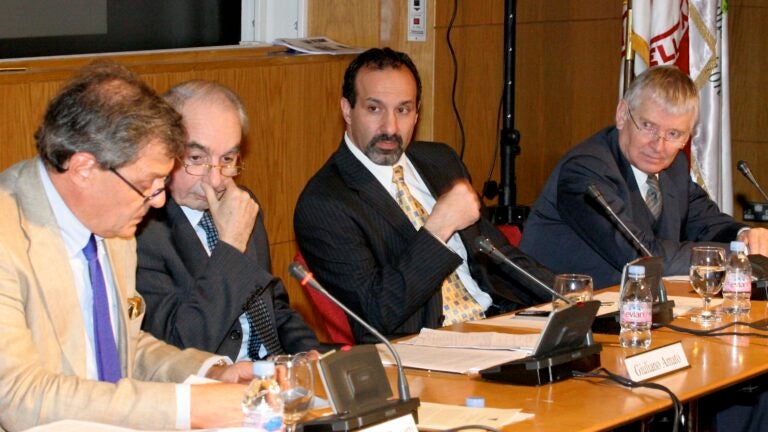American Studies, Dialogue Series, Panels, Race & Society, Regional Studies
Global Media Between Dialogue and War: When Enemies Boost the Ratings

On Tuesday February 26, 2008, CIRS hosted a one-day conference with the Italian organization Reset – Dialogues on Civilizations at Weill Cornell Lecture Hall 2.
This symposium featured an intensive set of discussions in which experts from the fields of media, journalism, international relations, and film studies came together to deliberate the consequences of using the international media as a weapon of war. The symposium was attended by students, journalists, scholars, Doha-based ambassadors, and other members of the public.
The audience and guests were welcomed by Mehran Kamrava, Director of CIRS, and Nina Zu Fürstenberg, Director of Reset. Guests were then were given a brief introduction by His Excellency Giuseppe Buccino Grimaldi, the Ambassador of Italy to Qatar, who praised the efforts of Georgetown University, Qatar Foundation, and Al Jazeera in their vision and value of progressive thinking, open dialogue and education.
Some of the speakers taking part in the symposium included Giuliano Amato, the Italian Minister of Interior, and Otto Schilly, Member of the German Parliament. Other speakers—including noted political figures, film-makers, academics, and practitioners—deliberated on several important issues pertaining to the relationship between media and war, as well as the state of the interaction between, broadly-defined, Arab and Western media.
Also discussed was the balancing act that many media conglomerates play between local demands and preferences on the one hand and international and multi-cultural trends on the other. This has resulted in a proliferation of multi-language media broadcasts. In the context of the post-9/11 global environment, broadcasts in Arabic have assumed particular significance as more media outfits are eager for a wider audience share n the Arab world. Other issues of contemporary relevance—immigration, terrorism, cultural diffusion—have also combined to heighten interest in the role of global media.
The audience also observed two documentary films and was able to address questions to the directors who presented their works. The first film was entitled “Who to Believe?” and was shown by the Iranian film-maker Hossein Dehbashi and his assistant Mateo Farzaneh. This was an edited version of a longer, seven-hour documentary commenting on the war in Iraq and how it has become a subject of polarization by its coverage in Western and Arab media.
The second documentary was a proposal introduced by Carlo Sartori, the CEO of NewCo Rai International, the Italian media organization, to launch an Arabic language channel from an Italian perspective. The hope is to ease some of the strained relations between the Arab world and the West by emphasizing cross-cultural communication.
The symposium concluded on the note that listening is as much a solution to war as speaking is, and that two-way communication is the simplest yet hardest-to-achieve model of communication.
Event Program
9:00 – 9:30 am Welcome
Mehran Kamrava, Director, Center for International and Regional StudiesH.E. Giuseppe Buccino Grimaldi, Ambassador of Italy in QatarNina Zu Fürstenberg, Director of Reset – Dialogue on Civilizations, Italy
9:30 – 11:30 am Panel I
Media as Weapons? Crossed views between East and WestThis panel analyzed how television and other media shape the mutual (in)comprehensions between different cultures and faiths, from mass-media and satellite television to the spread of blogging, and from vertical to horizontal communication. Panelists included:Giancarlo Bosetti, Reset Magazine, ItalyDaniela Conte, IMT Lucca, ItalyAshraf Galal, Qatar UniversityThomas Gorguissian, Qatar UniversityIbrahim Helal, Al Jazeera InternationalSteven Livingston, George Washington UniversityPaolo Mancini, University of Perugia, ItalyLawrence Pintak, American University of CairoMohamed Zayani, American University of Sharjah
12:00 – 1:30 pm Films and Discussion
Religious Television and International NewsThe Iranian film-maker Hossein Dehbashi and his assistant Mateo M. Farzaneh presented their latest documentary, and the Italian television producer Carlo Sartori presented the project of an innovative channel to be broadcast in the Mediterranean region.
1:30 – 3:00 pm Lunch Break
3:00 – 5:00 pm Panel II
How Politics Can Deal with the Media War
Presenters
Giuliano Amato, Italian Minister of InteriorGiancarlo Bosetti, Reset Magazine, ItalyMehran Kamrava, Director, Center for International and Regional StudiesOtto Schily, Member of the German Parliament
Summary prepared by Suzi Mirgani, a CIRS staff member.